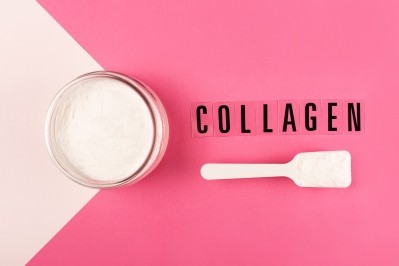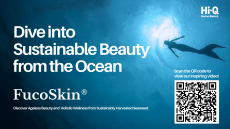Marine-based beauty ingredients: ‘Only a small proportion of their full potential has been explored’
![Whilst algae remains the most widely used in beauty and personal care, there remain a vast array of other marine ingredient resources largely untapped [Getty Images]](/var/wrbm_gb_food_pharma/storage/images/_aliases/wrbm_large/publications/cosmetics/cosmeticsdesign-europe.com/headlines/formulation-science/marine-ingredients-for-beauty-still-underexploited-though-algae-most-widely-used-finds-review/16285450-1-eng-GB/Marine-ingredients-for-beauty-still-underexploited-though-algae-most-widely-used-finds-review.jpg)
Writing in Marine Drugs, researchers from Portugal reviewed the scientific research behind use of marine-based natural ingredients and bioactive compounds for cosmetics and analysed the commercial opportunities and challenges in this sector.
Funded by the Portuguese government’s Foundation for Science and Technology, the review found that opportunities were vast, with an array of ingredients and compounds still under development for skin care and cosmetic products but it suggested future success relied on further research.
“Despite the multitude of cosmetics based on marine sources, only a small proportion of their full potential has been exploited,” the researchers wrote in the review.
“Many cosmetic industries have turned their attention to the sea to obtain innovative marine-derived compounds for cosmetics, but further research is needed to determine and elucidate the benefits.”
Marine environment an ‘underexploited resource’
The researchers said the variety of molecules and compounds that could be obtained from the marine environment was vast, highlighting it as an “underexploited resource, especially for deep-sea-inhibiting marine organisms that remain to be described”.
Of the compounds and ingredients being used already, they said many were integrated into cosmetics for their bioactive properties but there was also potential to use them for other benefits, such as increasing viscosity or modulating texture.
“Once valuable species are clearly identified, it will remain to optimise the mode of extraction of the molecules of interest and to ensure their effectiveness and safety for cosmetic applications, which are endless,” the researchers wrote. Bioactive compounds, for example, could increase protection against UV exposure, as well as improve skin condition and prevent skin ageing, they said.
Importantly, the researchers said all these ingredients should be considered “innovative compounds” because of the level of benefits offered and the fact there were no “terrestrial equivalents”.
‘Major challenges’ in commercialising marine-based ingredients
However, commercialising marine-based ingredient and compounds for cosmetics still faced “major challenges” ahead, according to the review.
“Although there are several recent review papers containing information on the use of marine-derived bioactive products in the cosmetic industry, such studies often focus on specific groups of organisms, usually macro- and microalgae, and lack an outline of the practical challenges associated with the commercialisation of such products,” the researchers wrote.
The main challenges, they said, included the overall sustainability of final formulations, production capacity, ecotoxicity, economic value and the amount of waste generated.
“Challenges in using marine-derived compounds as ingredients for cosmetic formulations arise from the level of standardisation, efficacy, and traceability, and can be categorised into three main categories: accessibility and efficient screening; sustainable production of the bioactives and knowledge of their mechanism of action; and market issues, such as processes, costs, and partnerships,” they said.
Overcoming these challenges required “fruitful cooperation among academics and cosmetic industries”, they suggested. This could ensure responsible sourcing of ingredients, the implementation of ecological manufacturing processes and experimentation with inventive recycling and reuse programs, they said, as well as certainty around safety and toxicology legal requirements when developing final products.
Algae phylum ‘most promising’ marine source for cosmetics
Considering the array of marine natural classes that could be tapped into to develop innovative ingredients and compounds for cosmetics, the researchers said one phylum (classification below kingdom but above class) of marine product had, so far, been more widely used and was particularly promising.
“Although organisms from different phyla present different and varied bioactivities, the algae phylum seems to be the most promising for cosmetic applications, presenting compounds of many classes,” they said.
According to the review, seaweeds were the “most extensively studied marine organisms” because they were biodegradable and a non-toxic source of natural compounds with a “vast array of bioactivities”. From antioxidant and immunomodulatory activities to anti-inflammatory assets, macroalgae or seaweeds had a lot to offer cosmetics, they said.
“…In fact, some of these compounds present higher bioactivities than their commercialised counterparts, demonstrating the potential presented by marine-derived compounds for cosmetic applications,” the researchers said.
Looking ahead, the review highlighted opportunities in other marine phylum sources as well, including porifera (marine sponges); chordata (sea-squirts); cnidaria; echinoderms (including starfish and sea cucumbers); bacteria; deep-sea fungi; corals; phytoplankton; and even sea water and sea mud.
Source: Marine Drugs
Published online ahead of print, doi: 10.3390/md21030170
Title: “Marine natural products as innovative cosmetic ingredients”
Authors: S. Fonseca et al.
![There are plenty of stories the beauty industry can tell to help consumers better understand blue biotechnologies and ingredients developed in this way [Getty Images]](/var/wrbm_gb_food_pharma/storage/images/_aliases/wrbm_medium/publications/cosmetics/cosmeticsdesign-europe.com/article/2023/03/21/blue-biotech-in-beauty-needs-better-storytelling-and-consumer-engagement-say-experts/16270672-1-eng-GB/Blue-biotech-in-beauty-needs-better-storytelling-and-consumer-engagement-say-experts.jpg)
![According to the sustainability marketing specialist, blockchain also enables brands to share their sustainability 'journey' with interested shoppers [Getty Images]](/var/wrbm_gb_food_pharma/storage/images/_aliases/wrbm_medium/publications/cosmetics/cosmeticsdesign-europe.com/article/2023/02/27/green-beauty-claims-secure-and-transparent-with-blockchain-technology-says-provenance/16202977-1-eng-GB/Green-beauty-claims-secure-and-transparent-with-blockchain-technology-says-Provenance.jpg)

![Could sun care developers perhaps look to fish for inspiration in UV protective formulas? Biotech could enable entire new categories to be born in beauty [Getty Images]](/var/wrbm_gb_food_pharma/storage/images/_aliases/wrbm_medium/publications/cosmetics/cosmeticsdesign-europe.com/headlines/formulation-science/beauty-biotechnology-future-is-strong-with-new-category-opportunities-ahead-says-arcaea-ceo/16133075-1-eng-GB/Beauty-biotechnology-future-is-strong-with-new-category-opportunities-ahead-says-Arcaea-CEO.jpg)
























